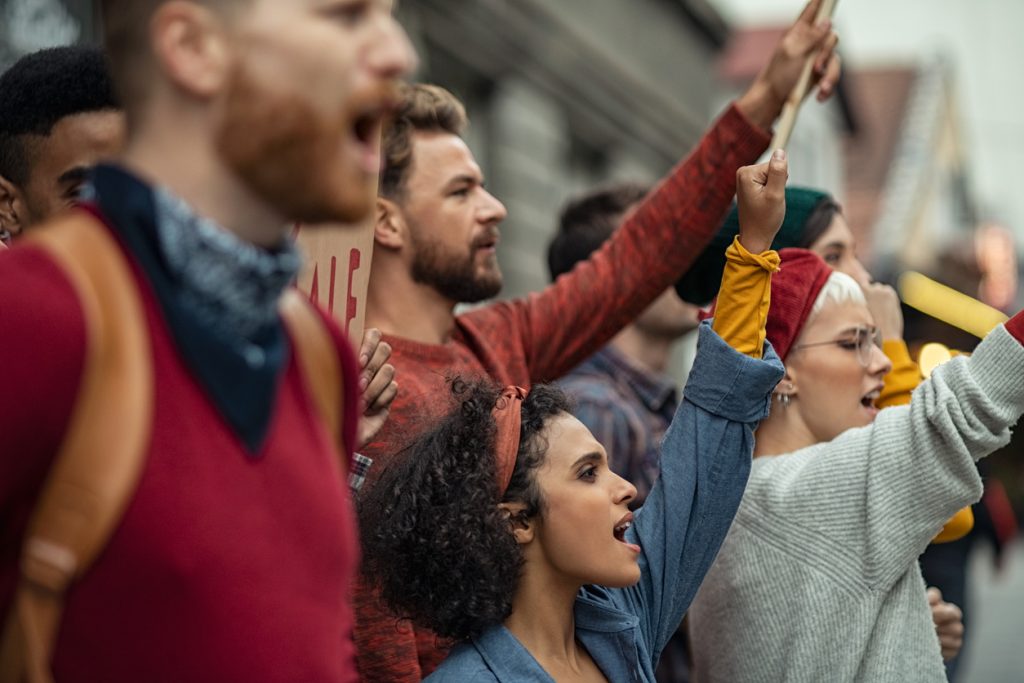Dr Andrea Schapper, Senior Lecturer in Politics, Faculty of Arts and Humanities, University of Stirling

Climate justice activism is central to the international climate conferences today. While world leaders come together in annual Conferences of the Parties (COPs) to agree further reductions of greenhouse gas emissions, climate finance, mitigation, adaptation and loss and damage, the climate justice movement brings a human face to these technical debates. How are children, women, disabled persons, the elderly and indigenous peoples affected by climate change? In which way do existing climate policies, like large-scale renewable energy projects, infringe upon the rights of indigenous peoples?
Climate justice activism can take place inside the climate change negotiation forum with civil society organizations advocating governmental delegations to make moderate changes to climate policies. Outside the negotiation forum, we often hear more radical demands calling for change in the capitalist economic system, elimination of deep-rooted inequality structures between North and South, and transformation of existing institutions, like the United Nations Framework Convention on Climate Change (UNFCCC).
Social mobilization for climate justice was particularly high at COP21, when the 2015 Paris Agreement was negotiated. Activists knew that the Paris conference was the moment to act together for climate justice, a unique opportunity to shape climate politics for decades. Inspired by a spirit of solidarity and the ambition to shape an agreement that would protect human rights of those most severely affected by climatic challenges, many diverse civil society networks worked together in a “super-network”. In a strong inter-constituency alliance, environmental activists, indigenous peoples, women and gender groups, land rights advocates, youth organizations, trade unions and human rights advocates pushed for including a human rights and sustainability framework into the Paris Agreement. This was the first time human rights have entered a binding environmental instrument. Hence, civil society advocacy was successful in ensuring that, according to the Paris deal, states “[…] should, when taking action to address climate change, respect, promote and consider their respective obligations on human rights.”
This level of social mobilization, however, could not be achieved in Glasgow this year, when state leaders came together to discuss the operationalization of the UNFCCC for the 26th time. Or to put it more bluntly: The UK COP26 presidency has failed to enable climate justice by restricting meaningful participation of those who bring local concerns to the international negotiation table: civil society organizations. This has happened despite earlier promises to make this “the most inclusive COP ever”.
Already prior to the negotiations, many civil society actors and even state leaders, especially those from the Global South, struggled to find their way to Glasgow. According to the COVID-19 regulations in place, many delegates from developing countries would have had to self-isolate upon arrival in Scotland, before attending the conference. But the horrendous hotel prices in and around Glasgow made it impossible for them to do so. Although the COP presidency announced that managed quarantine would be funded by the UK government, civil society organizations did not have information on how to access this funding. At the conference site, many additional COVID-19 restrictions were in place: During the world leaders’ summit in the first two days, two-thirds of the venue were closed for civil society observers. There was a ticketing system for participation but only 40 tickets per observer constituency were issued, although some constituencies, like environmental non-governmental organizations, comprise more than 600 partner organization. Civil society activists were advised to participate virtually but the online platform was unreliable and often did not guarantee that important negotiation streams could be followed by critical observers.
As a consequence, COP26 is conceived not only as the whitest and most privileged, but also as the most exclusionary COP that ever took place. This is also reflected in its outcome, the Glasgow Climate Pact which is a failure from a climate justice perspective: Insufficient mitigation commitments by states made at COP26 in 2021 will still lead to a global warming of 2.4 degrees and thus, UN Secretary-General Antonio Guterres has commented that the 1.5 degree global climate goal is alive “but on live support”.
The G77+China demanded a new financing facility for loss and damage (compensation for harm) but the Glasgow outcome agreement is so weak that it merely mentions the importance of ‘dialogue’ and discussing ‘arrangements’. A sign of hope was sent when Scotland announced that it would shoulder 2 million pounds to address loss and damage but most industrialized countries have actively resisted taking responsibility as they fear to be held liable by international courts for large sums in compensation payments.
A small win for developing countries is that industrialized countries will need to “at least double” the financial provisions for adaptation measures from 2019 levels by 2025. However, the decision on overall finance did not deliver on the initial COP26 objective to commit to $100bn of climate finance annually to developing nations; this goal will not be met before 2023.
At COP26, the Paris rulebook, i.e. the implementation guidelines of the Paris Agreement, were finalized. These contain references to human rights, social and environmental safeguards, and indigenous peoples’ rights. Important international standards, like Indigenous Peoples’ right to free, prior and informed consent, however, are missing from the Glasgow agreement. This means that carbon market projects remain at the risk of being carried out without obtaining consent from indigenous peoples’ at the local level – an important rights failure that has previously led to conflicts in mitigation policies and rendered them unsustainable. What we can learn from this year’s COP is that a presidency can enable or constrain climate justice advocacy; the UK presidency has certainly done the latter. Nevertheless, it could neither stop a hundred thousand people taking the streets of Glasgow to raise their voices for more meaningful climate action, nor could it halt the official civil society ‘walk-out’ on the last day of negotiations symbolizing disapproval with restrictions and lacking state ambition – and uniting those outside and inside the negotiations in their demand for more climate justice.
